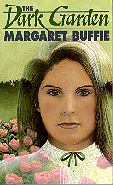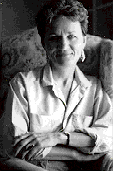


|
The Dark Garden.
Margaret Buffie.
Toronto: Kids Can Press Ltd., 1995. 237pp, cloth, $16.95.
ISBN: 1-55074-288-4.
Grades 7 - 10 / Ages 12 - 15.
Review by Diane Fitzgerald.
****/4
|
excerpt:
When one of the shadows asks me my name nothing comes -- just a
crackling emptiness. The shadows change into people in pastel clothing
who come and go and talk to me and are surprised when I answer them. But
not as surprised as I am when the words that slide into my head turn out
to be the right ones. They begin their tests. I show them that I can tell
a lamp from a tree and a cup from a glass, but over the next few days and
nights the white mist that is my memory never changes. At night they
leave me alone, and I sink into the garden's green darkness with sweet
relief.
In the daylight they come back and ask again and again -- do I
remember Thea? Her parents? They tell me that Thea is her . . . my
name -- Thea Austen Chalmers-Goodall. With a hyphen. I don't know her. I
am certain I could never have been Thea Austen Chalmers-Goodall.
With or without a hyphen.
I am no one.
 Margaret Buffie is the author of the acclaimed YA ghost story
Who is Frances Rain? In The Dark Garden,
Buffie makes good use of an epigraph from the Lady of Shalott;
various characters are imbowered in prisons real, psychological, and
supernatural. More importantly, Buffie handles the dialogue and characters with a rare
and welcome skill and assurance.
Margaret Buffie is the author of the acclaimed YA ghost story
Who is Frances Rain? In The Dark Garden,
Buffie makes good use of an epigraph from the Lady of Shalott;
various characters are imbowered in prisons real, psychological, and
supernatural. More importantly, Buffie handles the dialogue and characters with a rare
and welcome skill and assurance.
Thea, Buffie's sixteen-year-old protagonist, is in a
grim situation -- she is an amnesiac who wakes to find herself in an
unpleasant, barely functioning family, and half-possessed by the ghost of
a long-dead girl. But near the surface there is a charm, which, combined
with the well-drawn young characters, remind one of Doddie
Smith's classic I Capture the Castle.
Thea has many tasks to juggle on her journey through her own dark
garden. She must remember who she is -- although that seems less and less
attractive the more she finds about her family. Her parents are
progressively minded workaholics capable of saying things like, "We'll
dialogue later tonight, okay?" The parents, Thea learns, see the family
as a cooperative "unit" where everyone has their own areas of
responsibly. (Thea's appears to have been doing all the work and
child-rearing.)
One of her sisters resents her amnesia; the other, Wee
(named after her urinary habits, not her size), has emotional problems
that keep her acting the baby. Even Thea herself appears to have been a
tiresomely dramatic adolescent before the accident that brought on the
amnesia.
And then there is the ghost of Susannah, who disappeared
mysteriously decades ago in the house where Thea's family now lives.
Thea's experiences blend with Susannah's memories to make her grip on
reality even more tenuous.
In order for Susannah (and Thea) to find peace, they must solve the
mystery of Susannah's disappearance. This part of Thea's struggle is both
traumatic and thrilling, partly because it involves Lucas, an intriguing
and attractive young man who is trying to find his own peace despite the
psychic gifts that allow him to hear the voices of the dead and the
living.
In the end Thea finds a way out of the dark garden -- the prisons of
the family, the psyche, and the supernatural -- for both herself and
Lucas.
There might be one element too many in this
supernatural-coming-of-age-mystery-romance, but Buffie balances them all implausibly well. There are real chills here, and real
characters and problems that young readers, especially girls, will be
able to relate to.
Highly recommended.
Diane Fitzgerald is an elementary-school teacher in Saskatoon.
To comment on this title or this review, send mail to cmeditor@mts.net.

Copyright © 1996 the Manitoba Library Association.
Reproduction for personal use is permitted only if this copyright notice
is maintained. Any other reproduction is prohibited without permission.
Published by
The Manitoba Library Association
ISSN 1201-9364

CONTENTS FOR THIS ISSUE |
WELCOME


![]()

 Margaret Buffie is the author of the acclaimed YA ghost story
Who is Frances Rain? In The Dark Garden,
Buffie makes good use of an epigraph from the Lady of Shalott;
various characters are imbowered in prisons real, psychological, and
supernatural. More importantly, Buffie handles the dialogue and characters with a rare
and welcome skill and assurance.
Margaret Buffie is the author of the acclaimed YA ghost story
Who is Frances Rain? In The Dark Garden,
Buffie makes good use of an epigraph from the Lady of Shalott;
various characters are imbowered in prisons real, psychological, and
supernatural. More importantly, Buffie handles the dialogue and characters with a rare
and welcome skill and assurance.![]()
![]()